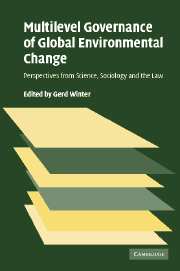 Multilevel Governance of Global Environmental Change
Multilevel Governance of Global Environmental Change Book contents
- Frontmatter
- PREFACE
- Contents
- List of figures
- List of tables
- Notes on contributors
- List of abbreviations
- 1 Introduction
- PART I Earth system analysis
- PART II Society and institutions of global; environmental change
- PART III Self-regulation of industry and the law
- 6 Private authority, global governance, and the law
- 7 Responsibility of transnational corporations in international environmental law: three perspectives
- 8 Transboundary corporate responsibility in environmental matters: fragments and foundations for a future framework
- PART IV The potential of the state
- PART V The potential of world regions
- PART VI Formation and implementation of international regimes
- PART VII Improving the instruments of global governance
- PART VIII Fundamental concepts of institutionalising common concern
- Index
7 - Responsibility of transnational corporations in international environmental law: three perspectives
Published online by Cambridge University Press: 04 May 2010
- Frontmatter
- PREFACE
- Contents
- List of figures
- List of tables
- Notes on contributors
- List of abbreviations
- 1 Introduction
- PART I Earth system analysis
- PART II Society and institutions of global; environmental change
- PART III Self-regulation of industry and the law
- 6 Private authority, global governance, and the law
- 7 Responsibility of transnational corporations in international environmental law: three perspectives
- 8 Transboundary corporate responsibility in environmental matters: fragments and foundations for a future framework
- PART IV The potential of the state
- PART V The potential of world regions
- PART VI Formation and implementation of international regimes
- PART VII Improving the instruments of global governance
- PART VIII Fundamental concepts of institutionalising common concern
- Index
Summary
Introduction
This chapter examines recent developments pertaining to the international responsibility of transnational corporations for activities that may cause harm to the environment. While the position of transnational corporations in international law has been subjected to previous analyses, also in regard to international environmental law, there are reasons for a new consideration of the topic.
First, transnational corporations substantially contribute to the worldwide stress on the environment. Many acts that deplete natural resources, contribute to the depletion of the ozone layer and to climate change, deplete fish stocks, clear-cut forests, move waste across boundaries, and so on, are not performed by states, but rather by economic entities operating in more than one state. Recent data indicate that the detrimental effects of the activities of transnational corporations on the worldwide environment are substantial. In the perspective of the book of which this chapter is a part, it can be said that transnational corporations pose a considerable challenge to global environmental governance.
Secondly, there is a variety of recent initiatives of a political and/or legal nature that seek to improve international regulation of transnational corporations. Noteworthy is the work of the ILC on international liability, the adoption of the Norms on the Responsibilities of Transnational Corporations and Other Business Enterprises with regard to Human Rights by the UN Subcommission on the Promotion and Protection of Human Rights, and the United Nations Global Compact.
- Type
- Chapter
- Information
- Multilevel Governance of Global Environmental ChangePerspectives from Science, Sociology and the Law, pp. 179 - 199Publisher: Cambridge University PressPrint publication year: 2006
- 6
- Cited by


